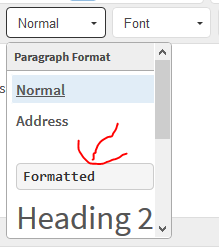How do you launch the code?
- Log in to post comments
How do you launch the code?
Is it one node or known nodes which can contain characters for escaping?
If so custom datatype may be a better solution.
Can you please provide an example?
I'm aware only of %XML.PropertyParameters but there's nothing but parameters.
Here's what I've coded.
Property:
Class Test.String Extends %String
{
ClassMethod StorageToLogical(%val As %String) As %String [ CodeMode = objectgenerator ]
{
set property = $g(%member)
do %code.WriteLine($c(9) _ "Quit """ _ property _ """")
quit $$$OK
}
ClassMethod LogicalToStorage(%val As %String) As %String [ CodeMode = objectgenerator ]
{
set property = $g(%member)
do %code.WriteLine($c(9) _ "Quit """ _ property _ """")
quit $$$OK
}
}Class:
Class Test.Obj Extends %RegisteredObject
{
Property prop As Test.String;
}However reference to property does not return anything (expected to return property name):
w obj.prop zw obj.prop >""
Any ideas?
Comment out OnGetConnections method and restart the service.
Do you still get errors?
What are the limitations of Community edition?
Good article!
Please post docker-compose definition as a text.
There's a code formatting style too

Check discussion for this article.
I would like to advise against this course of action, there are several reasons:
If you want it for debugging purposes you can add a trace event which would store ids only for example, but if you actually need to pass a set of results between different business hosts it may be beneficial to you to rethink the production architecture.
Here's some questions:
Nice!
Added screenshot.
Can you post a source code example?
If you're doing provisioning, consider using %Installer. It allows creation of Web Applications, among other things.
Thanks, Aleksandar!
So HTTPS/WebServices/WebSockets are not widely supported?
I was just reading the standard spec and it was kind of implying that HTTPS or WebSockets are the way.
Can you explain a bit what do you want?
Do you want to execute some query and pass all results in it from one process to another in a message?
Better unhighlighted code than a picture.
Some options:
> - Utilize another language or library that has methods to parse the data into an Excel file (https://stackoverflow.com/questions/17684610/python-convert-csv-to-xlsx).
If you want to use Python from Cache, check PythonGateway.
If you want to transfer data via REST check RESTForms project (part 2).
It's actually a wrapper for the same idea - if HeadOfQueue is checked, the resend message is inserted with a higher priority than the highest priority existing queue message. It can be seen in EnQueue method of Ens.Queue class.
Mimedata is subscripted by name and index.
So in your case:
set name = "BulkFileUpload"
for i=1:1:%request.CountMimeData(name)
set mimeData = %request.GetMimeData(name, , i)
}On each iteration mimeData variable would hold the stream with one next mimedata.
%request is simply an object of %CSP.Request class, check the docs or code to know how it works.
Additionally you can use this snippet to see what's inside %request, %response and %session objects:
set %response.ContentType = "html"
do ##class(%CSP.Utils).DisplayAllObjects()
quit $$$OKGreat article!
Here's a relevant article by @Vitaliy.Serdtsevon localizing error messages.
<FILEFULL> - Caché attempted to allocate a disk block for more global data or routine storage, but the attempt failed because the Caché database is full and could not be expanded.
Affected db is /hs-connect-hom/db/BPINTEGRADEV-GLB.
Bitmap indices maintain one node per each chunk of 64 000 id's, if at least one id from that range exists. So random integer ids can slow bitmaps down. On the other hand if there are two consecutive but spread (i.e 1..1000 and 100000...110000) id sequences it would generate just 2 global nodes so everything should be ok in that scenario.
Check index global in various scenarios:
Example.Bitmap
Eduard, are you referring to the Priority property of the Ens.MessageHeader class?
Yes.
That seems to be used exclusively for marking the message for Async vs. Synchronous delivery.
These priorities are available:
#define eMessagePriorityHighSync 1
#define eMessagePrioritySync 2
#define eMessagePrioritySimSync 4
#define eMessagePriorityAsync 6Sync by default is 2, so specifying priority 1 may indeed help. Cursory glance at Ens.Queue indicates that messages with priority 1 would be processed first.
While messages do have priority, it seems to be internal property. You can try to check it on a dev system but I'd advise against changing it on a production system.
The easiest way is to have two operations - one for priority source, another for everything else and route messages to one or another operation.
Yes. To get a full list of reserved works execute:
zw ^%qCacheSQL("reservewords")
But this also means that you can't ship the whole vendor copy of the global as you will overwrite the onsite ID counter node.
You can! When you load globals specify /mergeglobal flag to merge the global with existing data instead of overwriting it:
set sc = $system.OBJ.Load("global.xml", "/mergeglobal=1")seed the ID counter at the site to a really high number
Bitmap indices would really slow down from that.